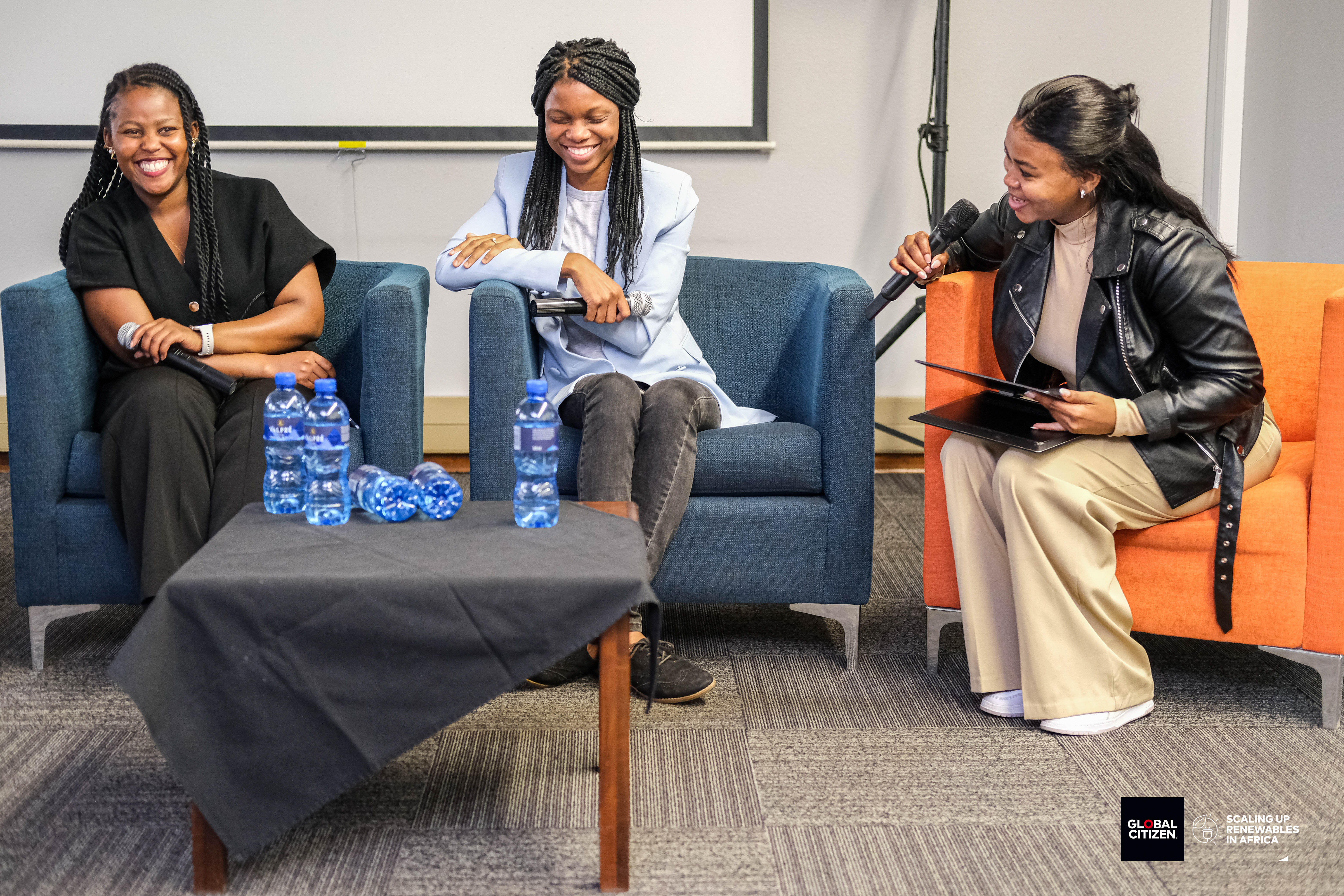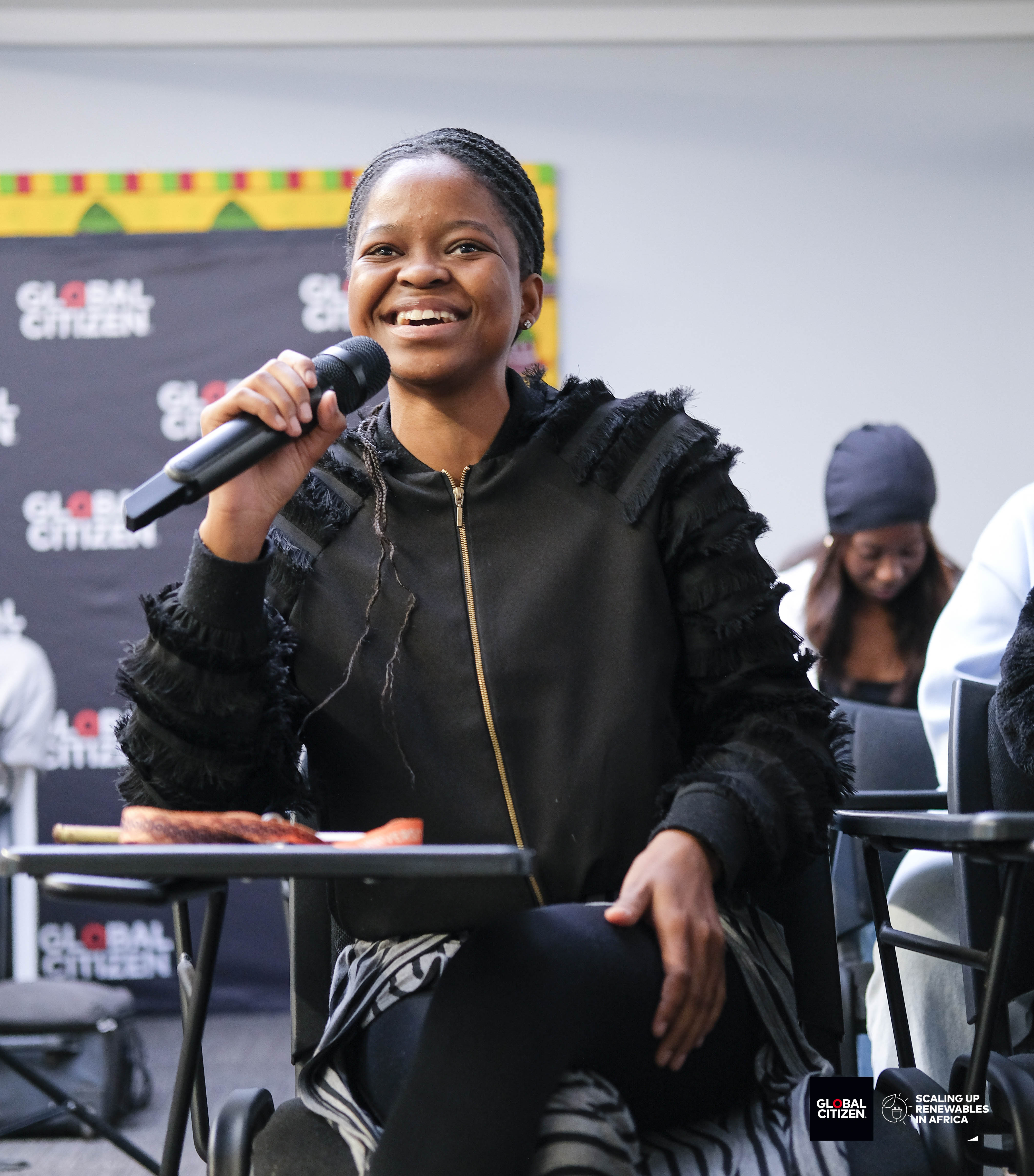The University of Johannesburg’s Auckland Park Bunting Road (APB) Campus came alive during the Youth Powering South Africa’s Energy Future workshop — an ideas-driven gathering attended by students, lecturers, and advocates passionate about shaping a sustainable energy future for Africa. Hosted by Global Citizen in collaboration with the University of Johannesburg (UJ), the event encouraged young people to explore practical solutions and think creatively about how energy access connects to education, opportunity, and dignity.
The day was officially opened by Lungile Magagula, a Global Citizen Fellow, who welcomed participants and introduced the Scaling Up Renewables in Africa campaign, Global Citizen’s initiative aimed at accelerating renewable energy adoption across the continent. Magagula outlined how the program promotes clean energy investment, youth engagement, and policy reform to drive Africa’s move to affordable and sustainable power. He encouraged students to see themselves as key contributors to this transformation, highlighting that “every action, every idea, and every conversation on energy matters.”
Life Without Power: Students Share Their Stories
One of the most relatable moments of the workshop came when students spoke about their experiences with power interruptions.
A student from Alexandra, a township in Johannesburg, recalled losing electricity for eight hours while studying: “I was reading for an exam, and the lights went off. I couldn’t study, and it was stressful,” he said. Another described struggling to prepare for finals without access to Wi-Fi or charging stations.
Others spoke about how power cuts disrupted meal preparation or caused food spoilage. Many said they often resort to studying by candlelight. These personal stories showed how inconsistent access to energy affects academic performance, time management, and emotional well-being.
Panel Discussion: Why Energy Access Matters
The panel, Why Energy Access Matters, brought together thought leaders committed to advancing sustainable and inclusive energy solutions. The discussion featured Dr. Jama Mashele Mohale, Postdoctoral Research Fellow at the Centre for Ecological Intelligence (CEI); Hope Dlamini, Global Citizen Fellow and youth advocate; and moderator Sinoxolo Cakata from Power Shift Africa.
Dr. Mohale opened by emphasizing how deeply energy challenges are woven into everyday life. “Energy access isn’t only a technical issue — when one part of the system fails, it affects everything else,” she explained. “From farming to education, energy connects every part of society. We need to understand those links if we want lasting solutions.”
When asked about how energy shortages influence young people, Dlamini reflected on the testimonies shared by students. “Energy access supports dignity, education, and opportunity,” she said. “It’s not just about keeping the lights on — it’s about creating an environment where students can learn and people can thrive.”
The discussion also explored the trade-offs individuals face when power is unreliable. Dr. Mohale noted that “time and money are often redirected toward planning around energy. That takes a mental toll, too, because you’re constantly adapting.”
Audience members contributed examples from their own communities, noting how energy availability differs between areas. One student shared that while some residences have limited backup lighting, others lose Wi-Fi completely during outages, forcing students to study in corridors or use mobile data. The conversation prompted reflection on how planning and policy can address these gaps in access.
If You Could Control the Power for a Day…
In a creative interactive segment, Cakata invited students to imagine they could control their community’s electricity supply for 24 hours. The responses were both practical and forward-thinking.
“I’d power schools, clinics, and essential services first,” said one participant. Another added, “We could save energy by switching off non-essential lighting and electronic billboards at night.”
Others proposed smart load management — where electricity use is priced differently depending on the time of day — as a way to promote efficiency and fairness. The exercise showcased how young people are already thinking about sustainability, innovation, and balanced energy use.
Policy and Practical Action
The dialogue then turned to how students and communities can influence energy policy and implementation. Dr. Mohale emphasized that progress requires shared responsibility: “We can’t wait for others to solve problems for us. Everyone — citizens, researchers, entrepreneurs — has a role to play in improving energy access.”
Dlamini spoke about the importance of youth participation in national energy strategies. Drawing on her experience with the SURA Fellowship Program, she emphasized the need to invest in youth skills and enterprise development. “Job creation is central to building a sustainable energy future,” she explained. “We need to prepare young people to lead, build, and manage the energy systems of tomorrow.”
Dr. Mohale closed the session by emphasizing collaboration: “Partnerships between communities, academia, and policymakers can unlock the change we all want to see.”
The Energy Zone Challenge
After the panel, students broke into small groups for the Energy Zone Challenge — a dynamic, hands-on activity where they designed innovative energy solutions for their communities. Each group identified a specific challenge and proposed a creative way to address it, drawing on what they had learned throughout the day. The groups then presented their ideas in an engaging “elevator pitch” style to the audience and panel. Three groups were ranked and winners announced, with their pitches set to be featured as part of the Scaling Up Renewables in Africa campaign. The challenge encouraged teamwork, critical thinking, and practical problem-solving — all key skills for Africa’s next generation of energy leaders.
From Ideas to Urgent Action
As the event drew to a close, participants reflected on what they could do next. Dr. Mohale encouraged students to start small and build from within their own environments.
“Innovation begins locally,” she said. “We already have the creativity, now it’s about applying it where we are.”
Dlamini concluded with an inspiring message: “Invest in your own learning. The more informed we are, the better we can contribute to sustainable change. Energy transformation starts with knowledge.”
The Youth Powering Africa’s Energy Future workshop left students energized, inspired, and motivated to turn ideas into action. Together, they proved that young people are not only the leaders of tomorrow, they’re already shaping the energy future of today.

